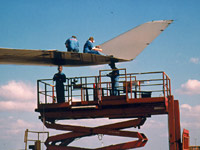Aviation - AVIAAH4500
Stream Summary
Faculty: SCI - Faculty of Science
School: School of Aviation
Contact: http://www.aviation.unsw.edu.au/
Program: 4500 - Science (Honours)
Award(s):
Bachelor of Science (Honours)
View stream information for previous years
Stream Outline
Honours in Aviation can be completed full-time or part-time. Students commence their enrolment in semester 1 (S1) or semester 2 (mid-year entry). For S1 entry, students are to commence work on their research in February for completion in late October. For mid-year entry, students are to commence in July for completion in late May. Students should check with undergraduate school administrator and honours coordinator for current enrolment deadlines and completion dates.
Learning Outcomes
On completion of this stream students should be able to:
- demonstrate an advanced understanding of a specific aviation topic;
- demonstrate an ability to undertake scientific research;
- demonstrate an understanding of the research process as applied to aviation;
- develop a research proposal on a specific aviation topic;
- write a research report evidencing good practice in report writing; and
- present their work to peers, staff and other interested persons in a seminar format.
Stream Structure
The program involves a research project that forms the majority of the assessment. The project, although supervised, is to be completed with substantial independence and self-direction. In addition, the program involves a series of student consultations, tutorials and seminars. Students should seek to meet with other School researchers and academics to stimulate research ideas and aid the research process. Honours Students must attend a series of compulsory workshops on ethics, research design, data analysis, thesis writing, presentation skills and publishing (see Assessment below).
Assessment
Tutorial classes
Weekly workshops on topics which include ethics, research design, fundamental statistics and maths, data analysis, survey design, thesis writing and synthesis, project / time management, presentation skills and professional development. Workshops are held in semester 1 and vary in length from half-day to a day. Please note, the workshops’ exact topics and schedules may vary subject to staff availability.
Assessment method: Students are required to submit exercises for feedback but does not contribute to final honours grade.
Preliminary introduction and literature review
3000-7000 words; comprises the introduction to the final thesis.
Assessment method: Marked by primary supervisor.
Contribution to final grade: 20%
Presentation 1
Present work in progress; 15 minutes with 5 minutes for questions.
Assessment method: Students are graded by the academics in the audience.
Contribution to final grade: 5%
Presentation 2
Present research finding; 30 minutes with 10 minutes for questions.
Assessment method: Students are graded by the academics in the audience
Contribution to final grade: 10%
Thesis
Maximum 15,000 words; 3 temporarily bound copies submitted to School office. Students should discuss the exact chapter structure with their supervisor.
Assessment method: Internally examined by at least 2 reviewers.
Contribution to final grade: 65%
Honours Grade Calculation
Hons. Class I (>85%)
Work of excellent critical evaluation through substantial independence and self-direction, reflecting superior quality in all aspects of research, writing and presentation. The work has no significant errors or/and deficiencies.
Hons. Class II, Division I (75% to 84%)
Work of very good critical evaluation through substantial independence and self-direction, reflecting very good quality in all aspects of research, writing and presentation.
Hons. Class II, Division 2 (65% to 74%)
Work of good quality in research, writing and presentation but with some significant errors or/and deficiencies.
Hons. Class III (50% to 64%)
Work is in acceptable form and demonstrates basic research, writing and presentation skills. The work has several significant deficiencies.
Fail (<49%)
Work has a number of major flaws and there is evidence of lack of basic knowledge.
The thesis will be reviewed by at least two internal reviewers other than the supervisor(s). A panel will then determine the allocation of final honours grade.
Admission Requirements and Process
Requirements
A minimum of a 3 year full time Bachelor degree (AQF level 7) specialising in Aviation with a minimum average mark of a credit. This typically includes the UNSW 3980 Aviation (Flying) and 3981 Aviation (Management) programs but may include other Bachelor of Science or Bachelor of Engineering programs where students have majored in Aviation or Aerospace Engineering.
Process
Students who meet the entry requirements, or expect to do so, should make contact with potential supervisors. Further information about staff research interests and projects can be obtained via UNSW Research Gateway (http://research.unsw.edu.au) and UNSW Aviation webpage (http://www.aviation.unsw.edu.au/research/research.html). Following this, students should contact undergraduate student office and complete an honours application form before the due date (typically February for S1 and June for S2).
Pathways
Students with successful honours may be qualified to enrol in postgraduate level studies (Master of Philosophy, Master of Science by research or Ph.D.), depending on the level of honours obtained and the area in which research is to be undertaken. Further information can be gained from School of Aviation webpage: http://www.aviation.unsw.edu.au/research/research.html
Graduates of honours degree in aviation may find employment in research, government and industry. Past graduates of honours in aviation have found employment in all of the above sectors.









